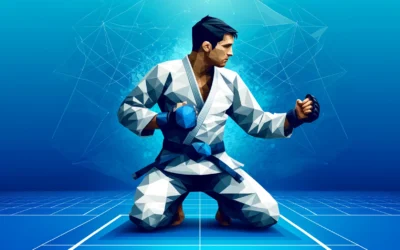The ecological approach provides an effective way to enhance skill acquisition and performance in martial arts and other sports. This approach shifts the focus from isolated techniques to the interaction between the athlete and the environment. Rather than breaking skills down into simplified parts and drilling those in repetitive drills, the ecological approach looks at the whole complex system of the athlete acting within a performance environment.
The aim is to support athletes in attuning themselves to the most useful information sources available during practice and competition. By picking up key information, athletes can self-organize adaptable movements and decisions fitting the specific conditions. The emphasis is on each athlete directly perceiving information to guide his or her actions, rather than memorizing and executing techniques predetermined by a coach.
Extensive research in the science of motor learning over the last 100 years has demonstrated the superiority of the ecological approach for developing skills compared to traditional, technique-focused training methods. These traditional methods are built on the belief that skills can be created by dividing techniques into parts, repeating those parts in isolated drills, and then reconstructing the whole technique.
However, the abundant research evidence shows that skills actually emerge from the interaction between the athlete and the performance environment. Isolated repetition of technique parts often fails to transfer when the athlete returns to the complex, dynamic environment of competitive performance. By keeping training fully connected to realistic performance demands, the ecological approach ensures skills transfer out of practice into competition.
Theoretical Basis – Direct Perception
The ecological approach to training is scientifically grounded in key insights from the field of ecological psychology. The most central of these is the concept of direct perception. Extensive research over decades has proven our perception of the surrounding environment takes place directly through the pickup of informational variables by our sensory systems. Skilled perception does not require internal mental representations or computations.
For example, a fighter engaged in sparring can directly see opportunities for specific actions in the movements, positions, and orientations of their opponent. They do not have to cognitively analyze the situation and consciously decide what options are available. The information is perceived directly through vision and guides their actions fluidly and spontaneously. Research shows we pick up information detecting affordances in our environment through our active exploration and interaction.
According to the ecological dynamics approach to learning design, providing explicit technical instruction, such as an ideal model or technique, focuses the athlete’s attention very narrowly on a predetermined cue. This deliberate focus restricts and degrades the athlete’s perception of the wider array of information sources available. These additional informational variables are needed to support adaptable decision-making and movement choices fitting the dynamic conditions in competition.
Direct perception allows fluid improvisation and responsiveness, while pre-planned techniques promote rehearsed, robotic reactions insufficiently tailored to the present context. Skills honed under variable, realistic conditions through dynamic problem-solving carry over to competition. Pre-scripted technical repetition often leads to poor transfer outside limited drills.
Affordances and Intentions
Within ecological psychology, information supporting perception and action is known as affordances. Affordances refer to the possibilities for action offered to an individual by objects, surfaces, events and other aspects of the surrounding environment. For a fighter on the mat, potential affordances may include opportunities to grab, hit, kick, off-balance or sweep the opponent.
An important factor shaping which affordances an athlete will perceive and act upon is their intention. Skill training can be focused by directing athletes’ intentions towards key affordances useful for achieving their aims. Coaches applying the ecological approach aim to guide the intentions of their athletes in order to attune their attention towards the most relevant informational variables. This enhances the athlete’s perception of the affordances offering the greatest opportunity for success based on their objectives.
For instance, a striker’s intention to off-balance and strike an opponent will attune their attention to different informational sources than a grappler’s intention to tie up and submit the opponent. The coach does not need to provide explicit technical instruction, deconstructing actions into steps and prescribing ideal movement patterns. Instead, training tasks and environments are designed to direct athletes’ intentions in ways that will attune their attention to pick up information supporting the desired actions. The athletes learn effective perception and action through active exploration and problem-solving experiences.
Emergence of Movement Solutions
A key premise of ecological psychology is that each situation an athlete faces is unique, with its own distinct set of constraints. Even subtle differences in the opponent, competitive environment or task lead to different affordances demanding distinct movement solutions fitted to the present circumstances. Rather than repeating pre-planned techniques, athletes are challenged to find novel movement and decision-making solutions tailored to the constraints of the present moment.
Effective, functional movements emerge spontaneously from the real-time interaction between the athlete and the competitive environment. The focus is responding appropriately to ever-changing contexts, not replicating fixed ideal techniques. However, through consistent intentions, athletes are attuned to key information from situation to situation. This allows generalizable, effective patterns of movement and decision-making to emerge across variations in conditions.
Athletes develop a broadly adaptable skill of solving momentary problems based on active perception, not simply a catalogue of rigid techniques covering predictable situations. Their flexibility and fluidity come from attunement to the most useful information to support ongoing problem-solving in context. While each specific repetition is unique, the essential process of intending, perceiving information, and acting upon it to produce movement remains consistent.
Designing Ecological Martial Arts Training Environments
To successfully implement the ecological approach, coaches must design training:
- That maintains unstructured interactions, avoiding pre-set routines, to mimic the spontaneity of competitive performance environments
- That promotes adaptive movement solutions fitting present conditions rather than repetitive rehearsal of techniques
- Using tasks that direct athlete intentions toward key information sources relevant to their aims
- Incorporating high levels of variability between and within practice tasks to prompt perception and action exploring unique solutions fitting changing contexts
- That develops skills while facing live opponents resistant to actions and contributing realistic unpredictability
- With emphasis on movement exploration to solve present problems over high repetitions for technique refinement
In the ecological approach, the coach’s role is designing practice tasks, not prescribing techniques. Practice should attune fighter perception, intention, decision making and movement towards the information supporting success within competitive performance environments. Learning arises from the unique interactions and exploratory problem-solving of each practice session as athletes actively hone solutions fitting the specific constraints at that moment.
Advantages of Ecological Approach to Martial Arts Training
A large body of research evidence across sports has found that ecological training produces athletes with:
- Superior capability to effectively adapt techniques and tactics to match the subtle specific demands of continuously changing, unforeseeable competitive conditions
- Increased sensitivity in perceiving the most useful available information to support split-second decision-making under intense pressure
- Enhanced fluidity, spontaneity and creativity in discovering new effective movement patterns tailored to the immediate circumstances
- Improved capability to swiftly switch between different techniques, tactics and strategies fitting moment-to-moment changes in conditions
- Greater skill responding effectively under pressure to unique, unfamiliar situations, rather than relying solely on recognizable, repeated patterns
- Resilience against stress and anxiety induced by unpredictability, through the variability inherent in ecological training
These performance advantages result from the deep attunement to key information sources that emerge through the dynamic variability in conditions which is inherent in properly designed ecological training. Research in martial arts, wrestling, judo, boxing, fencing and other combat sports confirms that ecological training develops fighters with superior capability to apply skills effectively in competition compared to traditional technique repetition methods.
Perception-Action Coupling
A key insight from ecological psychology is perception and action are tightly coupled, happening as a seamless whole. The perception of useful information directly triggers fitting actions without the need for conscious processing. Research clearly shows perceiving information relevant to performance is itself an action. The old model separated perception, cognition and action. The ecological approach recognizes they fuse together, occurring as a unified process.
Traditional training also tends to isolate technique skills from tactics and strategies. But in competition, they mesh together. An ecological approach develops integrated tactical-technical skills, fitting actions to situations. Technique and strategy become inseparable, as intentions and perception guide strategic action. In training, technical drill repetitions are blended with free tactical play.
Solving the Transfer Problem
Studies comparing ecological training to traditional repetitive drills have consistently shown far superior transfer of skill to competitive performance. Performance in competition relies on skill adapting to dynamically changing, unpredictable conditions. Traditional repetitive training leads to skills that function well only in specific predictable conditions.
When conditions inevitably change, athletes are unable to adapt their rigid skills. Ecological training develops adaptable skills by simulating competitive unpredictability. The environment presses athletes to evolve flexible skills fitting ever-changing contexts. They perceive key information directly specifying the requirements of the present conditions and act accordingly. The transfer is built in rather than expected after isolated training.
Evolution Over Time
While ecological dynamics provides a rigorous framework, specific implementations evolve as coaches creatively apply core principles in their contexts. Adjustments meet the unique needs of their athletes, sports and circumstances to enhance performance. Evolution is accelerated by sharing useful training innovations.
The ecological approach provides a model of interacting constraints, an emphasis on requisite variety, principles of differential learning and non-linear pedagogy. While founded on unified concepts, diversity in application promotes progress. There is no single correct recipe, but an adaptable framework coaches can harness creatively.
Improving Martial Arts Skill Through Ecological Training
The ecological dynamics approach represents an evidenced-based revolution in the science of developing skill in martial arts and other sports. The shift is from reductionist technique training to holistic development of perception and action. Skills emerge from the interaction between athlete and environment, with the coach designing conditions rather than instructing techniques. Ecological training better instils the adaptable, spontaneous skills that transfer to competitive performance. Athletes achieve superior capability to perceive information and produce fitting actions responsive to the dynamics of competition.





0 Comments